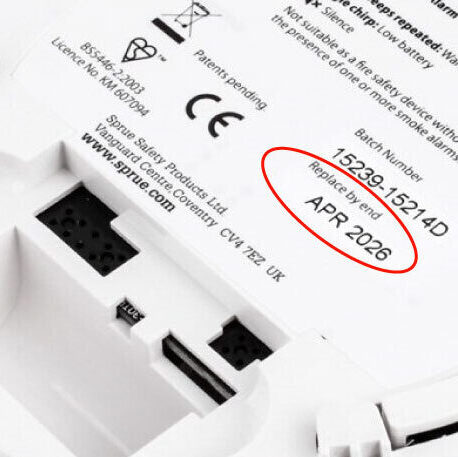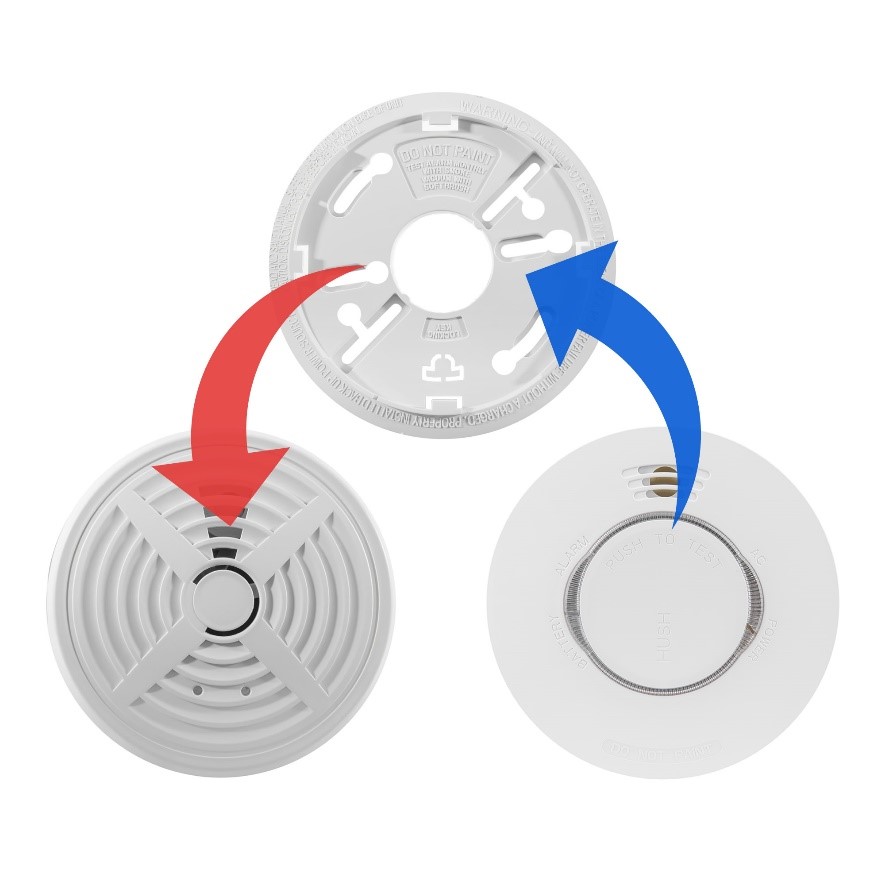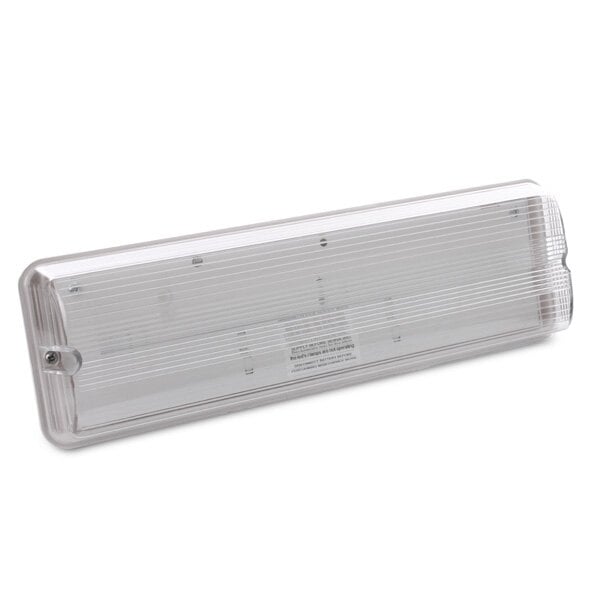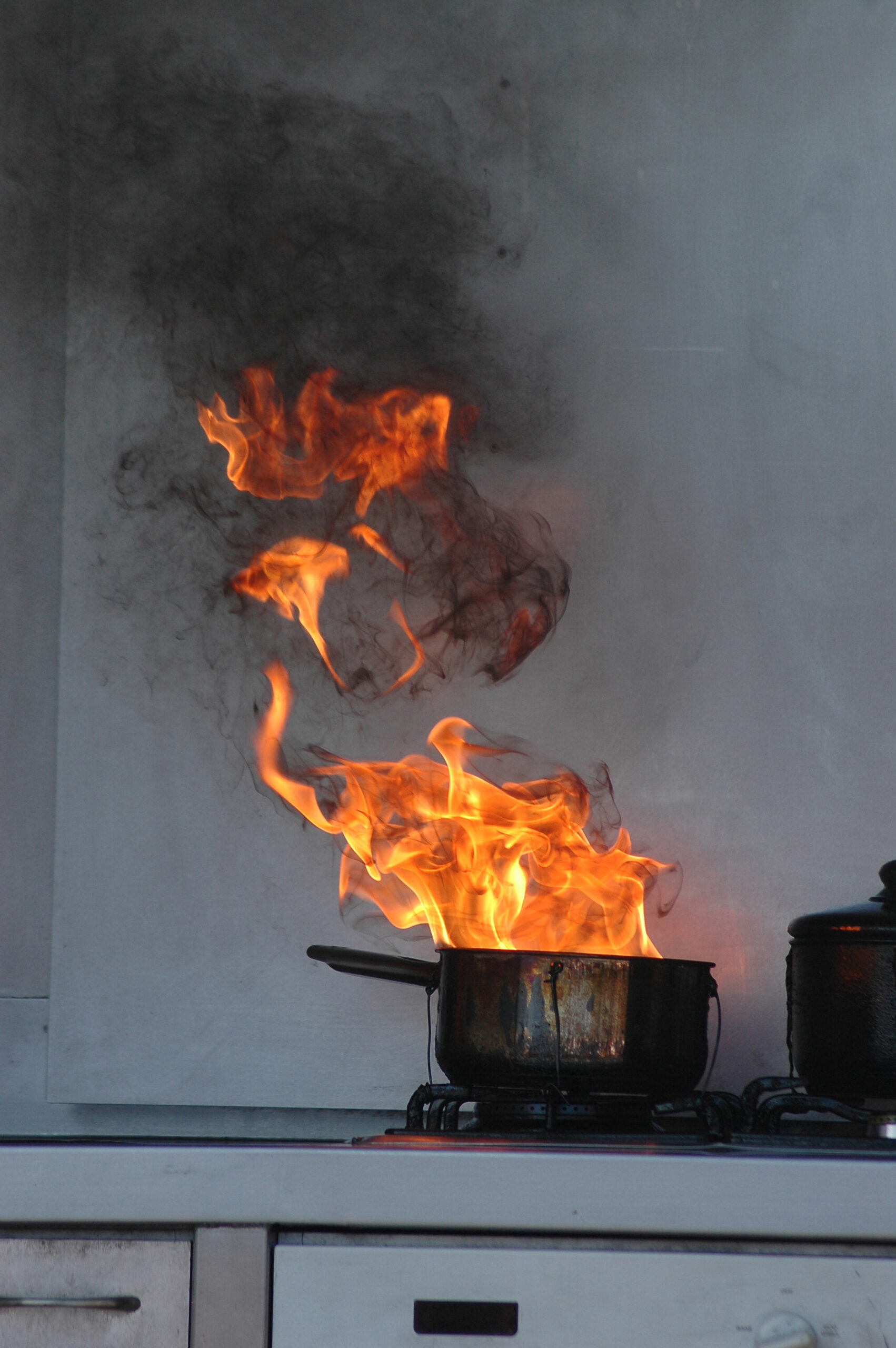Why is the smoke alarm beeping three times?
When your smoke alarm is beeping three times in succession, this typically indicates a specific message from the manufacturer. The smoke alarm beeping three times often signifies smoke detection – this is different from the single chirp pattern of a low battery warning. Some models use a pattern of three beeps followed by a pause, repeating this sequence to indicate the presence of smoke particles. This could be triggered by actual smoke, dust in the sensing chamber, steam or cooking fumes. If there’s no obvious smoke source, try cleaning the unit by gently vacuuming the exterior vents. In some newer models, a smoke alarm beeping three times can indicate a fault with the sensor itself. If cleaning doesn’t resolve the issue and you’ve verified there’s no fire, check your alarm’s user manual for specific beep pattern meanings or consider replacing the unit.
Why is the hardwired smoke detector chirping?
Your hardwired smoke detector chirping typically signals a specific issue that needs attention. Despite being connected to your home’s electrical system, most hardwired smoke detector units have backup batteries that require periodic replacement. The hardwired smoke detector chirping often indicates that this backup battery is low. Other potential causes include dust accumulation in the sensing chamber, power surges affecting the electronic components, loose wiring connections, or the unit reaching the end of its service life (typically 10 years). To troubleshoot, replace the backup battery first, then try resetting the alarm by disconnecting it from power and removing the battery for 30 seconds. If your hardwired smoke detector chirping continues, check for dust and clean the unit. For persistent issues, the age of the detector or wiring problems may require professional assessment.
Why is my mains powered smoke alarm beeping?
Your mains powered smoke alarm beeping is typically caused by one of several issues. Most
mains powered smoke alarms have backup batteries that need replacing periodically, and a low backup battery is the most common reason for beeping. Even though your smoke alarm is connected to mains power, the backup battery ensures protection during power outages. Other causes include dust accumulation on the sensing chamber, end-of-life warnings (
smoke alarms typically last 10 years), or a fault in the alarm itself. Try replacing the backup battery first, then clean the unit with a vacuum or hairdryer on a cool setting to remove dust. If your mains powered smoke alarm continues beeping after these steps, check the replacement date on the back – it may simply be time for a new unit.
Why is the smoke alarm beeping every 30 seconds?
When your smoke alarm is beeping every 30 seconds, this is almost always an indication of a low battery. This specific timing pattern is programmed by manufacturers as a low battery warning. The smoke alarm beeping every 30 seconds is designed to be annoying enough to prompt action but not so frequent that it’s confused with an actual fire alarm. Replace the battery as soon as possible using the correct type (usually 9V or AA, depending on your model). If the smoke alarm beeping every 30 seconds continues after battery replacement, the unit may have reached the end of its life (typically 10 years) or developed a fault. Check the manufacture date on the back of the alarm to determine if replacement is necessary.
Why is the smoke alarm beeping intermittently?
Your smoke alarm beeping intermittently can be caused by several factors. The most common reason for a smoke alarm beeping intermittently is a low battery that needs replacement. Other causes include dust or insects inside the sensing chamber, humidity fluctuations, temperature changes or the unit reaching the end of its service life. Clean your smoke alarm by gently vacuuming around the exterior vents to remove dust. Ambient conditions can also trigger intermittent beeping – smoke alarms are sensitive to rapid temperature changes or high humidity. If your smoke alarm beeping intermittently persists after battery replacement and cleaning, check the manufacture date – smoke alarms generally need replacement after 10 years, even if they appear to be working.
Why is the smoke alarm beeping without a battery?
When you experience a smoke alarm beeping without a battery, there are several possible explanations. For mains-powered units, the alarm can still beep without a backup battery installed because it’s drawing power from your home’s electrical system. The beeping may be a warning that the backup battery is missing and needs to be installed. For battery-only models, a smoke alarm beeping without a battery might actually be residual power in the capacitor that can cause chirping for a short time after battery removal. Another possibility is that you’re hearing beeping from a different alarm in your property. Try listening carefully to locate the exact source. If your smoke alarm beeping without a battery continues for more than a few minutes, check all other alarms in your home, including carbon monoxide detectors.
Why is the smoke alarm beeping with a new battery?
If your smoke alarm is beeping with a new battery, several issues might be causing the problem. First, ensure the new battery is properly seated in the compartment and is the correct type for your model. Sometimes, a smoke alarm beeping with a new battery occurs because the battery terminals aren’t making proper contact – try cleaning the contact points with a dry cloth. Another common reason is that the battery might be old despite being ‘new’ to your alarm – check the expiry date on the battery. Dust and debris in the sensing chamber can also trigger beeping even with a new battery installed. Finally, if your smoke alarm beeping with a new battery persists, check the unit’s age – smoke alarms have a service life of approximately 10 years, after which they should be replaced regardless of battery condition.
Why is the smoke alarm beeping after changing the battery?
When your smoke alarm is beeping after changing the battery, it can be frustrating but is usually solvable. The most common reason for a smoke alarm beeping after changing the battery is improper installation – check that the battery is correctly seated and the right type for your model. The battery compartment may not be fully closed, or the alarm might not be properly reattached to its mounting bracket. Some smoke alarms require a reset after battery replacement – look for a test/reset button to press and hold for about 15-20 seconds. Dust accumulated in the sensing chamber can also cause beeping to continue. If your smoke alarm beeping after changing the battery persists, verify the age of the unit – smoke alarms older than 10 years need replacement as the sensors degrade over time, regardless of battery condition.
Why is the smoke alarm beeping after removing the battery?
If you’re experiencing a smoke alarm beeping after removing the battery, this can be puzzling, but it has several explanations. Many smoke alarms contain capacitors that store a small amount of power, which can cause the smoke alarm to beep after removing the battery for a short period – usually up to 15-20 minutes. For hardwired models, the alarm continues to receive power from your home’s electrical system even with the backup battery removed. Some interconnected systems will continue beeping if any alarm in the network has a low battery or fault. Try waiting 20 minutes after battery removal to see if the beeping stops naturally. If your smoke alarm beeping after removing the battery continues beyond this time, check if it’s a mains powered unit or if another alarm might be causing the noise.
Why is the smoke alarm beeping every few minutes?
When your smoke alarm is beeping every few minutes, this typically indicates a specific issue that needs addressing. The pattern of the smoke alarm beeping every few minutes (rather than continuous sounding) usually points to a maintenance alert rather than a fire detection. The most common cause is a low battery that needs replacement. Other possibilities include dust accumulation in the sensing chamber, a fault in the electronic components or an end-of-life warning. Smoke alarms are designed to last approximately 10 years before requiring replacement. If your smoke alarm beeping every few minutes continues after installing a fresh battery and cleaning the unit, check the manufacture date on the back. For models approaching or exceeding 10 years of age, replacement is the best solution, as internal sensors degrade over time.
Why is smoke alarm beeping randomly in the middle of the night?
Your smoke alarm beeping randomly in the middle of the night is a common and frustrating issue. This typically happens because battery power naturally drops at night when temperatures fall. The smoke alarm beeping randomly in the middle of the night is actually the low battery warning becoming more noticeable as the battery power reaches a critical threshold in cooler nighttime temperatures. Another possibility is that steam or humidity from evening showers might be triggering the alarm if it’s located near bathrooms. Insects can also be more active at night and may enter the sensing chamber. To resolve nighttime beeping, replace the battery immediately, clean the unit thoroughly, and consider relocating alarms that are too close to bathrooms or kitchens. If the issue persists, check the age of your alarm – units older than 10 years should be replaced.
How do you stop a smoke detector from chirping without a battery?
To stop the smoke detector from chirping without a battery, you’ll need to follow specific steps depending on the type of unit you have. For battery-only models that are chirping without a battery installed, the issue may be residual power in the capacitor. To stop the smoke detector from chirping without a battery in this case, press and hold the test button for 15-20 seconds to discharge any remaining power. For hardwired models, even with the backup battery removed, they’re still connected to your home’s electrical system. You’ll need to turn off power to the circuit at your breaker box, then press and hold the test button to discharge the remaining energy. Some hardwired systems may require a reset procedure – disconnect the unit from the mounting bracket for 15 minutes, then reattach it. If chirping continues, the issue might be with another interconnected alarm in your system that needs attention.
Why is the smoke alarm beeping, but there is no smoke?
When your smoke alarm is beeping, but there is no smoke, several non-emergency factors could be triggering the alarm. The most common reasons for a smoke alarm beeping but no smoke include dust or insects in the sensing chamber, steam or high humidity, rapid temperature changes or cooking fumes that have reached the alarm. Clean your smoke alarm by gently vacuuming the exterior vents or using a hairdryer on a cool setting to blow out dust particles. Consider the location of your alarm – units placed too close to bathrooms or kitchens are prone to false alarms. Some alarms are more sensitive than others;
optical alarms are better for living spaces, while
heat alarms are more suitable for kitchens. If your smoke alarm continues to beep after cleaning, even though there is no smoke, check the age of the unit. Sensors deteriorate over time, and alarms older than 10 years should be replaced.
Why is the smoke detector beeping with a new battery?
If your smoke detector is beeping with a new battery, there are several potential issues to troubleshoot. First, ensure the smoke detector beeping with the new battery isn’t due to improper installation – check that the battery is correctly seated and the correct type for your model. Some smoke detectors require specific battery brands or types to function properly. The ‘new’ battery might actually be old or expired – check the expiration date. Dust and debris in the sensing chamber can also cause persistent beeping despite a fresh battery. Some models require a reset after battery replacement – look for a test/reset button and hold it for 15-20 seconds. If your smoke detector beeping with the new battery continues, check the manufacture date on the unit. Smoke detectors have a limited lifespan of approximately 10 years, after which internal sensors degrade regardless of battery condition.
Why is the smoke alarm chirping?
Your smoke alarm chirping is typically sending a specific alert message that requires attention. The distinctive chirping sound (different from the continuous alarm) usually indicates a maintenance issue rather than fire detection. The most common reason for a smoke alarm chirping is a low battery that needs replacement. Other causes include dust or insects in the sensing chamber, high humidity affecting the electronics or the unit reaching its end of life (typically 10 years). Some models use different chirping patterns to communicate specific issues – consult your user manual to decipher the message. To resolve the smoke alarm chirping, replace the battery with the correct type, clean the unit thoroughly and check the manufacture date. If your smoke alarm is approaching 10 years of age and continues chirping after battery replacement and cleaning, replacement of the entire unit is recommended.
How do you change the smoke alarm battery?
To change the smoke alarm battery effectively, follow these straightforward steps. First, identify what type of battery your alarm uses – typically, 9V or AA batteries are common. To change the smoke alarm battery safely, turn off power to hardwired models at the circuit breaker if applicable. For most models, twist the alarm counterclockwise to detach it from the mounting plate or open the battery compartment directly. Remove the old battery carefully, noting how it’s positioned. Insert the new battery in exactly the same orientation, ensuring it’s properly seated in the compartment. Close the battery door securely or reattach the alarm to its mounting plate by twisting it clockwise until it clicks. Once installed, press the test button to verify the new battery is working properly. For optimal protection, change the smoke alarm battery at least once a year or immediately when you hear the low battery warning chirp. Mark the replacement date on the inside of the battery compartment for reference unless your smoke alarm contains sealed batteries that are not designed to be replaced – in this instance, the product has reached the end of its life and should be replaced.




